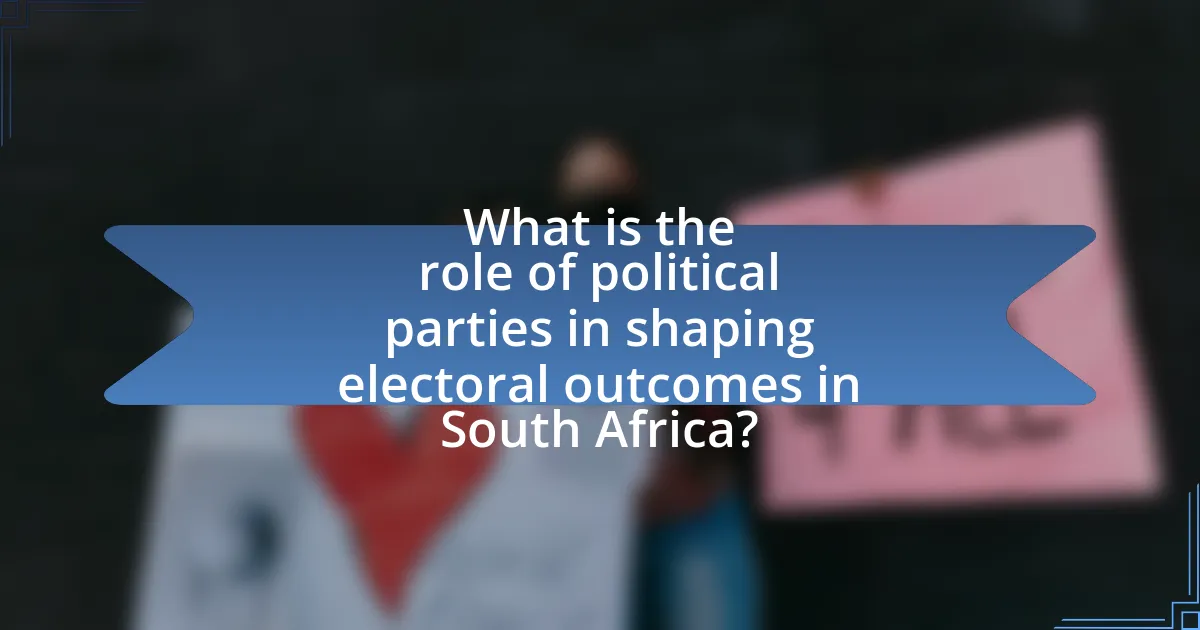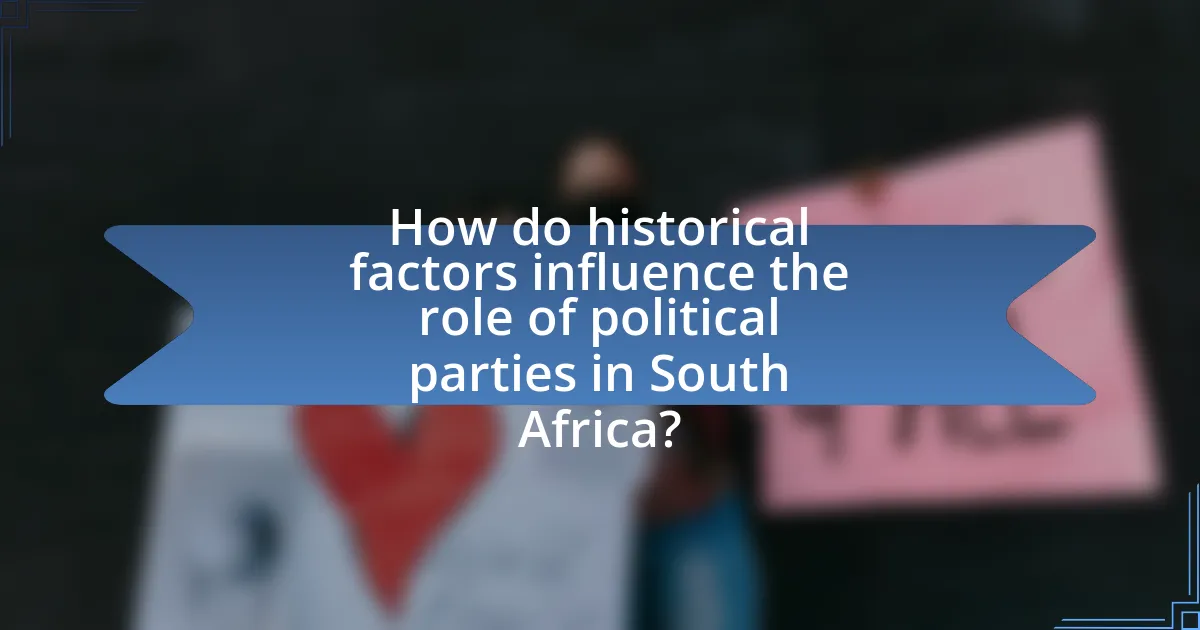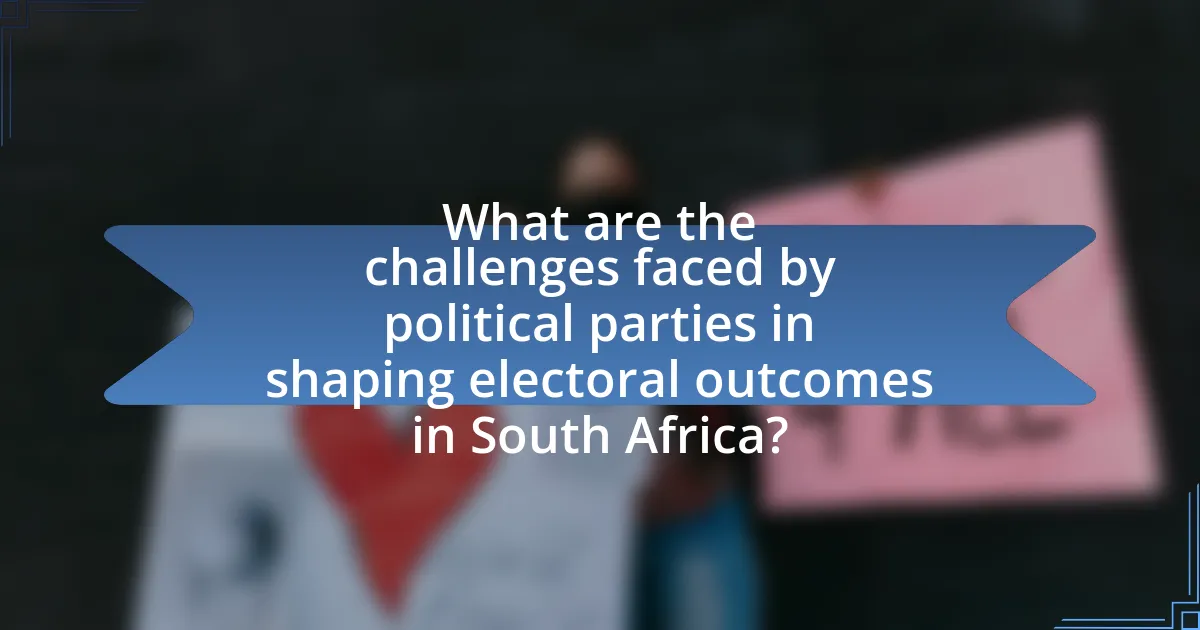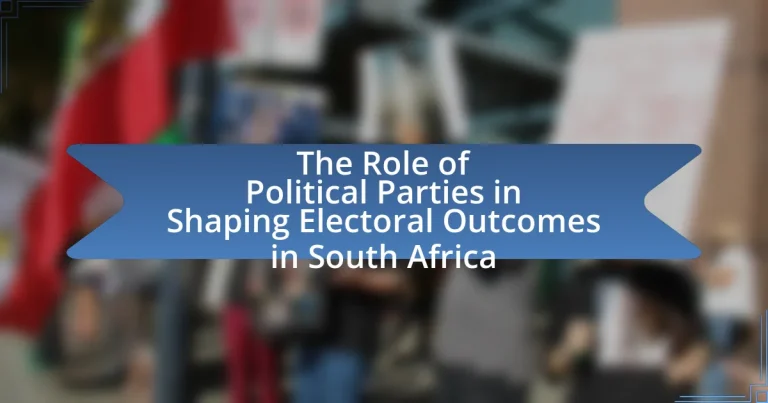Political parties are fundamental in shaping electoral outcomes in South Africa, influencing voter behavior, policy formulation, and the political landscape. The article examines how parties like the African National Congress (ANC) and the Democratic Alliance (DA) mobilize support through campaigns and grassroots initiatives, impacting voter turnout and preferences. It also explores the role of party affiliation in voting decisions, the strategies employed by parties to engage voters, and the significance of party competition in a democratic system. Additionally, the article addresses historical factors, socio-economic influences, and internal and external challenges faced by political parties, highlighting their impact on electoral policies and outcomes.

What is the role of political parties in shaping electoral outcomes in South Africa?
Political parties play a crucial role in shaping electoral outcomes in South Africa by influencing voter behavior, policy formulation, and the overall political landscape. They mobilize support through campaigns, manifestos, and grassroots initiatives, which directly impact voter turnout and preferences. For instance, the African National Congress (ANC) has historically dominated elections, securing over 60% of the vote in multiple national elections since 1994, demonstrating the party’s significant influence on electoral results. Additionally, political parties contribute to the development of political discourse and public opinion, as seen in the rise of opposition parties like the Democratic Alliance (DA), which has gained ground in urban areas, thereby affecting the ANC’s electoral performance. This dynamic interplay between parties and voters ultimately shapes the democratic process in South Africa.
How do political parties influence voter behavior in South Africa?
Political parties in South Africa influence voter behavior primarily through their political messaging, party loyalty, and mobilization efforts. Political messaging, which includes campaign promises and ideological positioning, shapes public perception and aligns voter preferences with party platforms. For instance, the African National Congress (ANC) has historically leveraged its legacy of anti-apartheid struggle to garner support, while the Democratic Alliance (DA) emphasizes governance and service delivery to attract voters.
Party loyalty is another significant factor; many voters in South Africa exhibit strong allegiance to specific parties, often influenced by historical, cultural, and social ties. This loyalty can lead to consistent voting patterns across elections, as seen with the ANC’s sustained support in various provinces.
Mobilization efforts, including grassroots campaigns and community engagement, further enhance voter turnout and influence. Political parties often organize rallies, door-to-door canvassing, and social media campaigns to engage potential voters, thereby increasing their visibility and appeal. According to the Electoral Commission of South Africa, voter turnout in the 2019 national elections was 65.99%, reflecting the effectiveness of these mobilization strategies.
Overall, the interplay of messaging, loyalty, and mobilization by political parties significantly shapes voter behavior in South Africa.
What strategies do political parties use to engage voters?
Political parties in South Africa engage voters through various strategies, including grassroots mobilization, social media campaigns, and targeted outreach initiatives. Grassroots mobilization involves organizing community events and door-to-door canvassing to directly connect with constituents, which has been shown to increase voter turnout. Social media campaigns leverage platforms like Facebook and Twitter to disseminate information, engage in discussions, and respond to voter concerns, reflecting the growing trend of digital engagement in politics. Targeted outreach initiatives focus on specific demographics, such as youth or marginalized communities, to address their unique needs and encourage participation in the electoral process. These strategies are supported by data indicating that personalized communication and community involvement significantly enhance voter engagement and influence electoral outcomes.
How does party affiliation affect voting decisions?
Party affiliation significantly influences voting decisions by shaping individuals’ political preferences and perceptions of candidates. Research indicates that voters often align their choices with the party they identify with, leading to a tendency to support candidates from that party regardless of specific policies or candidate characteristics. For instance, in South Africa’s 2019 elections, the African National Congress (ANC) garnered approximately 57% of the votes, reflecting strong party loyalty among its supporters. This loyalty is reinforced by social identity theory, which suggests that individuals derive part of their self-concept from their group affiliations, including political parties. Consequently, party affiliation serves as a heuristic for voters, simplifying the decision-making process and often overriding individual candidate evaluations.
What impact do political parties have on electoral policies?
Political parties significantly influence electoral policies by shaping the legislative agenda and determining the rules governing elections. In South Africa, political parties like the African National Congress (ANC) and the Democratic Alliance (DA) have historically impacted electoral policies through their platforms, which dictate campaign strategies and voter engagement methods. For instance, the ANC’s policies have emphasized social justice and economic transformation, which directly affect electoral laws and voter mobilization efforts. Additionally, the Electoral Act of 1998, influenced by party negotiations, established the framework for free and fair elections, showcasing how political parties can shape the electoral landscape.
How do party platforms shape electoral agendas?
Party platforms shape electoral agendas by outlining the core values, policies, and priorities that political parties advocate during elections. These platforms serve as a blueprint for candidates, guiding their campaign strategies and influencing voter perceptions. For instance, in South Africa, the African National Congress (ANC) has historically focused on social justice and economic equality in its platform, which directly impacts its electoral agenda and appeals to voters seeking change. Additionally, the Democratic Alliance (DA) emphasizes governance and accountability, shaping its electoral strategies to attract voters concerned about corruption and service delivery. The alignment of party platforms with public sentiment and pressing issues ensures that electoral agendas resonate with the electorate, ultimately affecting voter turnout and party success in elections.
What role do political parties play in policy formulation during elections?
Political parties play a crucial role in policy formulation during elections by developing platforms that outline their proposed policies and priorities. These platforms serve as a guide for voters, reflecting the parties’ positions on key issues such as healthcare, education, and economic development. In South Africa, for instance, parties like the African National Congress and the Democratic Alliance create detailed manifestos that articulate their policy intentions, which are then communicated to the electorate through campaigns and public engagements. This process not only influences voter perceptions but also shapes the political discourse, as parties compete to present the most appealing solutions to societal challenges. The effectiveness of these platforms can be observed in electoral outcomes, where parties that successfully resonate with public concerns often secure greater support, thereby validating their policy proposals.
Why are political parties essential for democracy in South Africa?
Political parties are essential for democracy in South Africa because they facilitate political representation and participation, enabling citizens to express their preferences and influence governance. In a diverse society like South Africa, political parties aggregate various interests and viewpoints, ensuring that different segments of the population have a voice in the political process. For instance, the African National Congress (ANC), Democratic Alliance (DA), and Economic Freedom Fighters (EFF) represent distinct ideologies and constituencies, contributing to a pluralistic political landscape. This competition among parties fosters accountability and transparency, as parties must respond to the electorate’s needs to secure votes, thereby enhancing democratic governance.
How do political parties contribute to political representation?
Political parties contribute to political representation by aggregating diverse interests and facilitating voter choice in elections. They serve as a bridge between the electorate and the government, enabling citizens to express their preferences through party platforms and candidates. In South Africa, for instance, the African National Congress and the Democratic Alliance represent different ideological perspectives, allowing voters to align with parties that reflect their values and priorities. This system enhances democratic participation, as evidenced by the high voter turnout in national elections, which reached approximately 65% in 2019, indicating active engagement in the political process.
What is the significance of party competition in a democratic system?
Party competition is significant in a democratic system as it fosters political pluralism, encourages voter engagement, and enhances accountability. Political pluralism allows diverse viewpoints to be represented, ensuring that various interests within society are voiced and considered in governance. This competition motivates parties to appeal to voters, leading to increased participation in elections, which is essential for a healthy democracy. Furthermore, when parties compete for power, they are incentivized to hold each other accountable, leading to better governance and responsiveness to public needs. Historical examples, such as the transition to democracy in South Africa in the 1990s, illustrate how competitive party systems can lead to more representative and effective governance.

How do historical factors influence the role of political parties in South Africa?
Historical factors significantly influence the role of political parties in South Africa by shaping their ideologies, structures, and electoral strategies. The legacy of apartheid, which enforced racial segregation and disenfranchisement, has led to the emergence of parties like the African National Congress (ANC), which focuses on anti-racism and social justice, while other parties, such as the Democratic Alliance (DA), have positioned themselves as alternatives to the ANC by appealing to a broader, often more racially diverse electorate. Additionally, the historical context of resistance movements and the transition to democracy in the 1990s has fostered a competitive political landscape where parties must navigate complex social dynamics and historical grievances to gain electoral support. This historical backdrop is evidenced by the ANC’s dominance in post-apartheid elections, reflecting its historical role in the liberation struggle, while the DA’s growth illustrates the shifting political allegiances among South Africa’s electorate in response to historical injustices.
What historical events have shaped the current political party landscape?
The current political party landscape in South Africa has been shaped significantly by the end of apartheid in 1994, which marked a transition to a democratic system. This pivotal event led to the establishment of the African National Congress (ANC) as the dominant political party, reflecting the majority’s desire for change and representation. The 1994 elections were the first in which all South Africans could vote, fundamentally altering the political dynamics and enabling the formation of a multi-party system. Additionally, the Constitutional Assembly’s work in drafting the 1996 Constitution established a framework for political engagement and civil rights, further influencing party development. The rise of opposition parties, such as the Democratic Alliance (DA) and the Economic Freedom Fighters (EFF), has also been a response to the ANC’s governance, showcasing the ongoing evolution of the political landscape. These historical events collectively underscore the transformation of South Africa’s political parties and their electoral outcomes.
How did apartheid impact the formation of political parties?
Apartheid significantly influenced the formation of political parties in South Africa by enforcing racial segregation and limiting political participation for non-white citizens. The oppressive policies of apartheid led to the emergence of various political movements, such as the African National Congress (ANC) and the Pan Africanist Congress (PAC), which sought to challenge the apartheid regime and advocate for the rights of black South Africans. The apartheid system’s restrictions on political expression and organization prompted the formation of underground and exiled political parties, which aimed to mobilize resistance against the government. For instance, the ANC was founded in 1912 but gained prominence during the apartheid era as it organized mass protests and armed resistance, ultimately leading to its pivotal role in the transition to democracy in the 1990s.
What lessons can be learned from past electoral outcomes in South Africa?
Past electoral outcomes in South Africa reveal critical lessons about the influence of political parties on voter behavior and democratic engagement. One significant lesson is the importance of addressing socio-economic issues; for instance, the African National Congress (ANC) has faced declining support due to perceived failures in tackling unemployment and inequality since 1994. Additionally, the rise of smaller parties, such as the Economic Freedom Fighters (EFF), illustrates that voters are increasingly seeking alternatives to traditional parties, emphasizing the need for political entities to adapt to changing public sentiments. Historical data from the 2019 elections showed that the ANC’s support dropped to 57.5%, the lowest since the end of apartheid, highlighting the consequences of neglecting voter concerns. These outcomes underscore the necessity for political parties to remain responsive and accountable to their constituents to maintain electoral viability.
How do socio-economic factors affect political party dynamics?
Socio-economic factors significantly influence political party dynamics by shaping voter preferences, party platforms, and electoral strategies. For instance, in South Africa, disparities in income, education, and employment levels affect how different demographic groups align with political parties. The African National Congress (ANC) has historically garnered support from lower-income communities by advocating for social welfare policies, while the Democratic Alliance (DA) appeals to middle-class voters with a focus on economic growth and governance. According to the 2021 South African Social Attitudes Survey, socio-economic status correlates with party support, indicating that parties must adapt their messages and policies to resonate with the economic realities of their constituents. This dynamic illustrates how socio-economic conditions can dictate party strategies and electoral outcomes.
What is the relationship between socio-economic status and party support?
Socio-economic status significantly influences party support in South Africa, with higher income and education levels often correlating with support for opposition parties, while lower socio-economic groups tend to favor the ruling party. Research by the Institute for Justice and Reconciliation indicates that individuals with lower socio-economic status are more likely to support the African National Congress (ANC), reflecting historical ties and reliance on state resources. Conversely, wealthier and more educated voters are inclined to support parties like the Democratic Alliance (DA), which promotes policies appealing to middle and upper-class interests. This trend is evident in electoral data, where voting patterns reveal a clear divide along socio-economic lines, reinforcing the relationship between socio-economic status and party support.
How do political parties address issues of inequality in their platforms?
Political parties in South Africa address issues of inequality in their platforms by proposing policies aimed at economic redistribution, social justice, and access to basic services. For instance, the African National Congress (ANC) emphasizes land reform and social grants to alleviate poverty, while the Economic Freedom Fighters (EFF) advocates for nationalization of key industries to address wealth disparities. These platforms are supported by statistics indicating that South Africa has one of the highest inequality rates globally, with a Gini coefficient of 0.63 as of 2021, highlighting the urgency of these issues.

What are the challenges faced by political parties in shaping electoral outcomes in South Africa?
Political parties in South Africa face several challenges in shaping electoral outcomes, including voter apathy, internal factionalism, and the influence of socio-economic factors. Voter apathy is significant, as evidenced by declining voter turnout rates, which fell from 77% in the 1994 elections to approximately 65% in the 2019 elections, indicating a disengagement from the electoral process. Internal factionalism within parties, particularly the African National Congress, has led to divisions that weaken party cohesion and electoral strategies. Additionally, socio-economic issues, such as high unemployment and inequality, shape voter preferences and can undermine party platforms, making it difficult for parties to effectively mobilize support. These factors collectively hinder political parties’ ability to influence electoral outcomes in South Africa.
What internal challenges do political parties encounter?
Political parties encounter several internal challenges, including factionalism, leadership disputes, and resource allocation issues. Factionalism can lead to divisions within the party, undermining unity and effectiveness, as seen in the African National Congress, where internal conflicts have historically affected its electoral performance. Leadership disputes often result in power struggles that distract from policy development and voter engagement, exemplified by the Democratic Alliance’s challenges in maintaining cohesion among its diverse membership. Additionally, resource allocation issues can hinder campaign efforts, as parties must balance funding and support among various initiatives and candidates, impacting their overall electoral strategy. These challenges collectively influence the ability of political parties to effectively shape electoral outcomes in South Africa.
How do leadership disputes affect party effectiveness?
Leadership disputes significantly undermine party effectiveness by creating divisions that hinder cohesive action and decision-making. When leaders within a political party are in conflict, it often leads to a lack of unified strategy, which can confuse party members and alienate voters. For instance, the African National Congress (ANC) has experienced internal leadership battles that have resulted in decreased electoral support, as seen in the 2019 national elections where their vote share dropped to 57.5%, down from 62.2% in 2014. Such disputes can also divert resources and attention away from campaigning and policy development, further diminishing the party’s ability to present a strong front to the electorate.
What role does party unity play in electoral success?
Party unity is crucial for electoral success as it fosters a cohesive message and strengthens voter trust. When a political party presents a united front, it enhances its ability to mobilize supporters, attract undecided voters, and effectively communicate its policies. For instance, research indicates that parties with high levels of internal cohesion tend to perform better in elections, as seen in the African National Congress’s consistent electoral victories in South Africa, where unity has been a key factor in maintaining its dominance since the end of apartheid. This demonstrates that party unity not only consolidates resources but also amplifies the party’s appeal, ultimately leading to greater electoral success.
What external challenges impact political parties during elections?
External challenges that impact political parties during elections include economic instability, social unrest, and media influence. Economic instability can lead to voter dissatisfaction, as seen in South Africa’s fluctuating unemployment rates, which reached 34% in 2021, affecting party support. Social unrest, such as protests against government policies, can divert attention from party campaigns and diminish their effectiveness. Additionally, media influence plays a crucial role; biased reporting or misinformation can shape public perception and alter electoral outcomes, as evidenced by the significant impact of social media on voter behavior in recent elections.
How do media portrayals influence public perception of political parties?
Media portrayals significantly influence public perception of political parties by shaping narratives and framing issues that resonate with voters. For instance, studies have shown that positive media coverage can enhance a party’s image and increase voter support, while negative portrayals can lead to decreased trust and support. Research conducted by the South African Audience Research Foundation indicates that media representation affects public opinion, with 62% of respondents stating that news coverage influenced their views on political parties during elections. This demonstrates that the way media presents political parties can directly impact electoral outcomes by altering voter perceptions and behaviors.
What is the effect of electoral systems on party performance?
Electoral systems significantly influence party performance by determining how votes translate into seats in the legislature. For instance, proportional representation systems tend to favor smaller parties, allowing them to gain representation relative to their share of the vote, as seen in South Africa’s National Assembly, where the African National Congress has historically benefited from this system. In contrast, majoritarian systems often lead to a concentration of power among larger parties, which can marginalize smaller parties and reduce overall political diversity. This effect is evidenced by the dominance of the ANC in South Africa, where the electoral system has facilitated its sustained majority despite fluctuations in voter support.
What best practices can political parties adopt to enhance their electoral outcomes?
Political parties can enhance their electoral outcomes by implementing data-driven campaign strategies. Utilizing voter data analytics allows parties to identify key demographics and tailor their messaging accordingly, which has been shown to increase voter engagement and turnout. For instance, the 2019 South African elections demonstrated that parties employing targeted social media campaigns significantly improved their reach and effectiveness, leading to higher voter participation rates. Additionally, fostering grassroots mobilization through community engagement initiatives can strengthen party support, as evidenced by the African National Congress’s successful local outreach efforts in previous elections.
How can political parties improve their voter outreach strategies?
Political parties can improve their voter outreach strategies by leveraging data analytics to identify and target specific voter demographics effectively. By analyzing voter behavior and preferences, parties can tailor their messaging and outreach efforts to resonate with different segments of the population. For instance, a study by the Pew Research Center found that targeted messaging can increase voter engagement by up to 20%. Additionally, utilizing social media platforms allows parties to reach younger voters, who are increasingly turning to digital channels for information. According to Statista, as of 2023, over 90% of South African internet users are active on social media, highlighting the importance of these platforms in outreach strategies.
What role does transparency play in building voter trust?
Transparency is crucial in building voter trust as it fosters accountability and openness in the electoral process. When political parties and electoral bodies provide clear information about their actions, decisions, and funding, voters are more likely to perceive them as credible and trustworthy. For instance, studies have shown that transparency in campaign financing can significantly influence voter confidence; according to a report by the Electoral Commission of South Africa, increased disclosure of funding sources correlates with higher public trust in political parties. This trust is essential for encouraging voter participation and ensuring the legitimacy of electoral outcomes.


